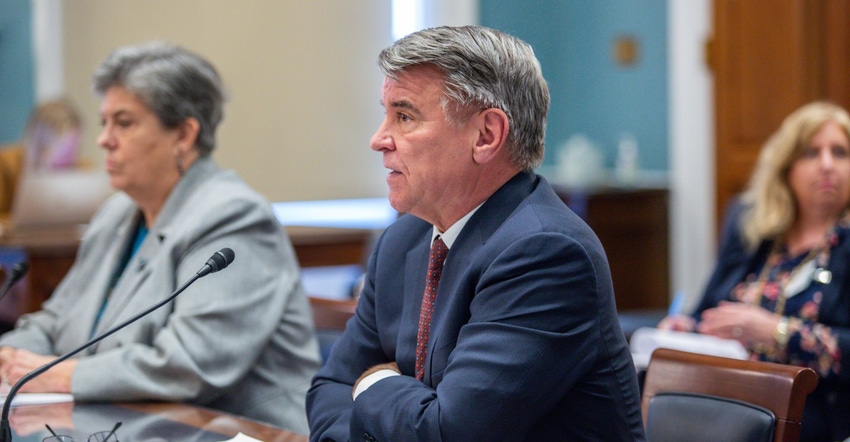
As Congress continues its work on evaluating the 2018 Farm Bill in preparation for the 2023 Farm Bill, stakeholders stressed the importance of building on the successes in current conservation programs as well as providing the technical assistance to help farmers further adopt practices that can benefit climate mitigation efforts.
During testimony at a House Agriculture Committee hearing to review the role of USDA’s programs in addressing climate change, Chuck Conner, president and CEO of the National Council of Farmer Cooperatives and a co-chair of the Food and Agriculture Climate Alliance, testified on the need to bolster Natural Resources Conservation Service funds by 10-20% for new and existing conservation programs as well as a 1% of total mandatory funding for the farm bill be set aside for technical assistance.
Joe Outlaw, co-director of the Texas A&M University-based Agriculture and Food Policy Center, works with over 675 farms across the country to understand priorities and impacts of farm policy. He said those producers have very strong, positive views about Environmental Quality Incentives Program, Conservation Security Program and the Regional Conservation Partnership Program.
“The only drawbacks being they have more projects they are willing to do than there is money to do them, and they question how priority areas are determined regionally,” Outlaw said. For example, EQIP applications were funded for only 27.7% of the 149,575 received. Of the roughly remaining 108,000 remaining applications, 46% were determined valid, but unfunded.
In 2020, the over 80 organizations that now are represented by FACA released a comprehensive list of recommendations on how to align climate and environmental goals while also ensuring agriculture’s continued economic sustainability. FACA is beginning a process to develop an expanded set of more farm bill-focused recommendations in the coming months, Conner told committee members.
“The potential for added costs to be pushed down to producers makes it imperative that the next farm bill provide the tools to help producers remain profitable,” Conner said. “With the right public policy, what could be an unsustainable cost can be turned into something that will boost farm income and rural communities.”
Data to expand understanding of conservation benefits
Kristin Weeks Duncanson, on behalf of the AGree Economic and Environmental Risk Coalition and who raises soybeans, corn and hogs on their Mapleton, Minnesota farm, testified on the importance of using the widespread data available at USDA of farming practices and outcomes to advance widespread adoption of conservation practices.
“Farmers must see how conservation practices benefit farm profitability to bring adoption up to scale,” she said. This data sharing is already occurring safely between USDA and producers on other farm bill programs and crop insurance.
Weeks Duncanson added, “Better information is the foundation of how I manage risks to my farm from war, pandemics, climate change and other disruptions outside of my control. I know that to get more farmers on board with conservation, we need more and better data that is up to date, accessible and can be analyzed to show the costs and benefits of these practices to farming operations.”
Coinciding with the hearing, the AGree Climate Food and Agriculture Dialogue or CFAD—a diverse and bipartisan group of producers, food and agriculture companies, and civil society organizations—released a new paper: Recognizing Early Innovators: Recommendations for Maintaining and Expanding Climate-Smart Agricultural Practices. The paper provides insight and recommendations on the challenges facing “early innovators”—leaders in conservation agriculture who have already tested and implemented climate-smart practices—as the U.S. works to develop a more resilient and profitable agricultural system.
Building on what works
Shakera Raygoza, owner and operator of Terra Preta Farm based in Edinburg, Texas, testified on behalf of the National Young Farmers Coalition. She said for young farmers, many believe the current application process for conservation programs is cumbersome, and sometimes feels out of reach for smaller producers.
She said programs that have worked well and should be expanded include EQIP and opportunities for cost share on cover cropping. She suggested if funding was available upfront it could also encourage more participation.
Weeks Duncanson also said her farm has utilized EQIP and CSP to try some practices on the ground to see which ones are beneficial to overall resilience. “The application is tedious and very time-consuming. You definitely need technical assistance,” she said.
Former North Dakota Sen. Heidi Heitkamp, on behalf of the Bipartisan Policy Center, repeatedly called on the committee to look at expanding workforce training for the NRCS and others who can provide technical assistance. BPC suggests expanding private sector partnerships with the Cooperative Extension program for climate-targeted technical assistance and providing tailored technical assistance to encourage tribes and historically underrepresented producers and landowners to adopt climate-friendly practices.
About the Author(s)
You May Also Like






